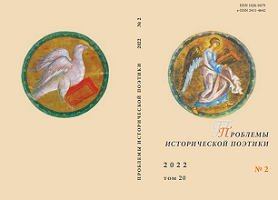Чудо и его восприятие героями «Казанской истории» — православными и мусульманами
A Miracle and Its Perception by the Heroes of “Kazan Chronicle” — Orthodox and Muslims
Author(s): Tatyana F. VolkovaSubject(s): Cultural history, Customs / Folklore, Culture and social structure , Theory of Literature, Sociology of Literature
Published by: Петрозаводский государственный университет
Keywords: Miracles; visions; prophecies; “Kazan Chronicle”; Ivan the Terrible; plot; capture of Kazan;
Summary/Abstract: The article explores the genre varieties of the miraculous used by the author of “Kazan Chronicle” to reveal the main ideas of the story, which form a kind of storyline. At the beginning of the article, the author provides an overview of the existing classifications of mystical material in medieval narrative works — “miracles,” “visions,” “prophecies,” noting the lack of a single viewpoint on the distinction between these concepts, which allowed to consider all these varieties in the “Kazan Chronicle” as a whole. Most often, the author of the “Kazan Chronicle” uses the form of “visions” that perform a prophetic function: long before the capture of Kazan by Ivan the Terrible in 1552, they predict the victory of the Moscow autocrat over the Kazan kingdom, while both Russian warriors and the people of Kazan see visions of the miraculous appearances of Russian saints (Sergius of Radonezh, Nicholas the Wonderworker). The author uses the prophecies of the Kazan magi, the Kazan queen, and the demon who served as a soothsayer of Kazan’s destinies in the “Kazan Chronicle.” Along with “visible” miracles, the author of the “Kazan Chronicle” saturates his narrative with “invisible” miracles, exposing in his commentaries what he believes to be the true causes of certain historical events, and seeing the direct intervention of higher forces that contributed to the favorable course of the advance of Ivan the Terrible’s troops to Kazan and its siege. Penetrating the entire fabric of the narrative, these authorial references to divine providence create a providential context — a mystical reality that helps to present Ivan the Terrible not only as a talented commander, but also as a person performing a “God-guided feat” for the glory of the Russian land.
Journal: Проблемы исторической поэтики
- Issue Year: 20/2022
- Issue No: 2
- Page Range: 211-230
- Page Count: 20
- Language: Russian

